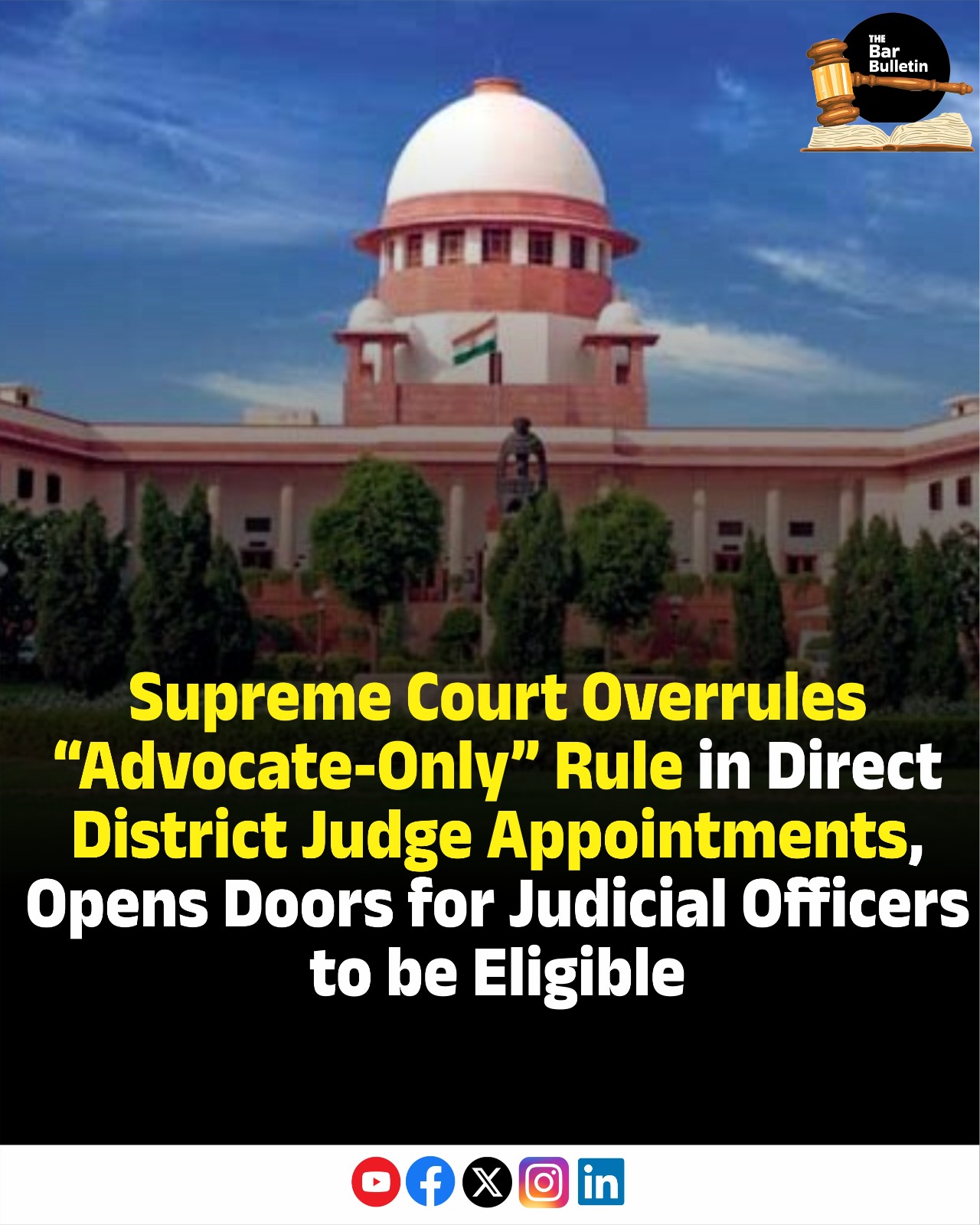The Supreme Court allowed a batch of appeals by in-service judicial officers, holding that judicial officers (Civil Judges) can participate in direct recruitment for District Judge posts if eligible as per other applicable criteria.
The 2020 Supreme Court judgment in Dheeraj Mor v. High Court of Delhi[1] had barred judicial officers from eligibility for direct recruitment, holding that only current members of the Bar were eligible. This judgment was referred to a larger Constitution Bench after widespread litigation and divergent views.
High Court and State rules universally divided District Judge appointments between “service” (promotion) and “Bar” (direct recruitment) quotas. Judicial officers with prior seven-year advocacy experience, on joining the service, lost eligibility for “Bar” quota. The petitioners sought recognition of their eligibility, arguing that exclusion solely on the ground of government service was arbitrary and unsupported by the constitutional text.
Petitioners argued that the text of Article 233 creates two streams for District Judge entry (service and Bar), but does not bar judicial officers with requisite advocacy background from competing under the direct recruitment stream.
The Constitution Bench comprising Chief Justice B.R. Gavai, Justice Aravind Kumar, Justice Satish Chandra Sharma, Justice K. Vinod Chandran, and Justice M.M. Sundresh held that Article 233(2) must be read to allow judicial officers (with seven years’ bar experience) to be considered for direct District Judge posts, so long as state rules provide. Chief Justice Gavai penned the majority opinion while Justice Sundresh authored the minority concurring opinion.
The Bench overruled Dheeraj Mor v. High Court of Delhi and portions of Satya Narain Singh[2], finding their restriction contrary to both the constitutional text and the merit-based objective. The judgment relied on broader readings of Chandra Mohan v. State of Uttar Pradesh and Others[3] and Rameshwar Dayal v. The State of Punjab and Others[4], emphasizing that the “service”/“not already in service” clause was not meant to rigidly bar in-service candidates from competing for direct recruitment if otherwise qualified.
In result, judicial officers with a minimum of seven years’ advocacy experience, who are now in judicial service, may apply for direct recruitment to District Judge posts, if State rules so permit. The judgment explicitly overrules contrary precedent and mandates that future recruitment consider all meritorious candidates, be they service members or advocates, to advance the efficiency and integrity of the judiciary.
The Court directed all States, in consultation with High Courts, to update rules to clarify eligibility and promote uniformity, while upholding the “promotee:direct:limited competitive” (50:25:25) ratio.
Cases relied on:
1. Chandra Mohan v. State of Uttar Pradesh and Others, 1966 SCC OnLine SC 35
2. Rameshwar Dayal v. The State of Punjab and Others, 1960 SCC OnLine SC 123
Cases referred to:
1. Deepak Aggarwal v. Keshav Kaushik and Others, (2013) 5 SCC 277
2. State of Assam and Another v. Kuseswar Saikia and Others, (1969) 3 SCC 505
3. Panduranga Rao v. State of Andhra Pradesh and Others, (1975) 4 SCC 709
4. Sushma Suri v. Govt. of National Capital Territory of Delhi and Another, (1999) 1 SCC 330
5. Vijay Kumar Mishra and Another v. High Court of Judicature at Patna, (2016) 9 SCC 313
6. All India Judges’ Association and Others v. Union of India and Others, (2002) 4 SCC 247
7. All India Judges’ Association and Others v. Union of India and Others, 2025 SCC OnLine SC 1184
8. Reserve Bank of India v. Peerless General Finance and Investment Co. Ltd. and Others, (1987) 1 SCC 424
9. Vivek Narayan Sharma and Others (Demonetisation Case – 5 J) v. Union of India and Others, (2023) 3 SCC 1
10. Union of India and Another v. Hansoli Devi and Others, (2002) 7 SCC 273
11. Satish Kumar Sharma v. Bar Council of H.P., (2001) 2 SCC 365
12. Leela Dhar v. State of Rajasthan and Others, (1981) 4 SCC 159
13. Property Owners Association and Others v. State of Maharashtra and Others, 2024 SCC OnLine SC 3122
Cases Overruled:
1. Dheeraj Mor v. High Court of Delhi, (2020) 7 SCC 401
2. Satya Narain Singh v. High Court of Judicature at Allahabad and Others, (1985) 1 SCC 225
[1] (2020) 7 SCC 401
[2] (1985) 1 SCC 225
[3] 1966 SCC OnLine SC 35
[4] 1960 SCC OnLine SC 123



